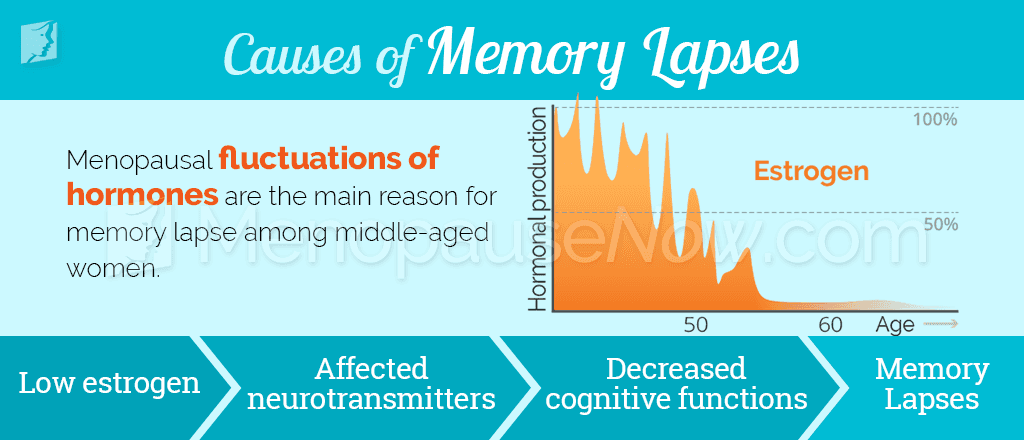Several factors can contribute to memory lapses in women experiencing menopause. Like many other menopause symptoms, memory lapses are caused largely by hormonal imbalance. Memory lapses can also be a result of other menopause symptoms that affect a woman's concentration level and mental retention. Certain risk factors or lifestyle choices may increase women's chances of experiencing memory lapses as well.
Continue reading to learn about the hormonal causes of memory lapses, as well as other causes and risk factors, in order to have a better idea of how to treat them.
Hormonal Causes of Memory Lapses
Memory lapses are a common occurrence for women experiencing perimenopause. As a woman approaches menopause, certain hormone levels in the body decrease. These diminishing levels of hormones, particularly of estrogen, have a myriad of effects upon a woman's body and mind.
In the case of memory lapses, estrogen plays a key role. It has a large effect on the functions of the brain and influences language skills, mood, attention, and a number of other functions, including memory. Estrogen is directly linked to verbal word fluency, or the ability to remember names and words. It's no wonder, then, that as a woman's estrogen levels begin to drop, her memory may suffer.
Estrogen's Effect on Memory
Estrogen activates different regions of the brain, including an area responsible for memory, called the hippocampus. In the hippocampus, estrogen acts to increase levels of a neurotransmitter called acetylcholine, which influences memory. Additionally, estrogen relaxes and opens up blood vessels to allow more blood flow to the brain, influencing memory and other brain functions.
While hormonal changes can trigger memory lapses, there are other issues that may be at work as well. Certain women may be more at risk than others. Read on to learn more about potential risk factors for menopausal women.

Risk Factors for Memory Lapses
Although hormone fluctuations are the most common cause of memory lapses in menopausal women, there are other risk factors that can increase the likelihood of this symptom.
Risk Factors

- Excessive amounts of alcohol
- Some medications (e.g., sleeping pills, antidepressants, blood pressure and heart medications, painkillers, tranquilizers)
- Vitamin deficiencies
- Poor diet
- Lack of sleep
- Excessive workload
In addition to these risk factors, there are other symptoms attributed to menopause itself that could influence a woman's ability to concentrate. Keep reading to learn more about other menopause-related factors.
Other Menopause Symptoms That Cause Memory Lapses
Memory lapses can be affected by other menopause symptoms, especially symptoms that fatigue or distract the mind.
Common Menopause Symptoms That Can Lead to Memory Lapses
- Hot flashes
- Night sweats
- Depression
- Anxiety
- Stress
- Sleep disorders
- Mood swings
Many researchers agree that other menopause symptoms, like hot flashes and mood swings, can influence memory lapses. All can be traced to the same hormonal source as well.
In certain cases, memory lapses can be a sign of a more serious problem, in which case professional assistance is recommended. Continue reading to find out when it would be wise to see a doctor about memory lapses.
When to See a Doctor about Memory Lapses
Did You Know?
A weaker memory is also a sign of getting older. Cell death in the brain begins as early as age 40, but measurable intellectual slowing doesn't occur until age 60 and doesn't accelerate until age 80.
Memory lapses are only a problem for a woman going through menopause if she finds they are interfering with her daily life, in which case she should consult a healthcare provider. In such cases, memory lapses could be more than a symptom of menopause.
If a woman is experiencing severe memory lapses, where she finds it difficult to recall information she's known for years and routinely used, she should consult a doctor to be checked for the following illnesses associated with memory lapses:
- Alzheimer's disease
- Infections of the brain, such as encephalitis or meningitis
- Head trauma, stroke
- Multi-infarct dementia
- Cancer
- Attention deficit disorder (ADD)
Fortunately, at whatever level a woman is experiencing memory lapses, there are solutions. Click on the following link to read more about the treatments for memory lapses.
Sources
- Greendale, G.A. , Derby, C.A. & Maki, P.M. (2012). Perimenopause and Cognition. Obstetrics and gynecology clinics of North America, 38(3), 519-535. doi: 10.1016/j.ogc.2011.05.007
- Henderson, V.W. (2008). Cognitive Changes after Menopause: Influence of Estrogen. Clinical Obstetrics and Gynecology, 51(3), 614-626. doi: 10.1097/GRF.0b013e318180ba10



